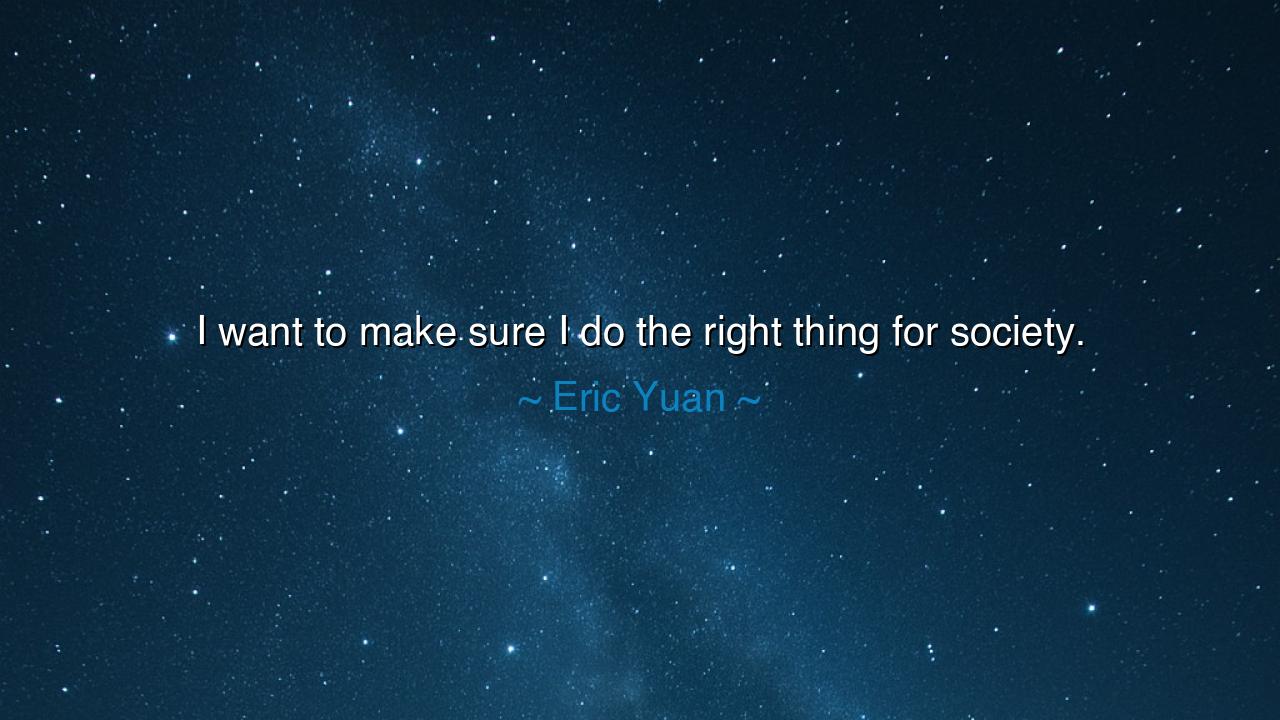
I want to make sure I do the right thing for society.






The words of Eric Yuan—“I want to make sure I do the right thing for society.”—shine like a simple yet noble vow, spoken by one who understands the burden of responsibility that comes with power and invention. In them lies the heart of a truth as old as civilization: that every gift of leadership, every tool of creation, every rise to prominence, carries with it a duty not only to the self but to the whole. Yuan, the founder of Zoom, whose creation became the bridge for human connection in a time of isolation, voices here not ambition for wealth or glory, but the yearning to ensure that his work uplifts rather than destroys.
The ancients would have called this the virtue of phronesis—practical wisdom, the discipline of choosing rightly not just for oneself, but for the community. Kings who forgot this duty became tyrants, inventors who ignored it unleashed destruction. But those who remembered it became healers of their people. Yuan’s words echo this timeless wisdom: that technology and power are double-edged swords, capable of blessing or harming, depending on the heart of the one who wields them. To “do the right thing for society” is not merely a choice, but a calling.
History gives us luminous contrasts. Alfred Nobel, the inventor of dynamite, once saw his creation used for war and ruin rather than the industry and progress he intended. Troubled by this, he resolved to leave behind the Nobel Prizes, ensuring that his legacy would forever honor peace, science, and literature rather than destruction. In this we see the same spirit Yuan invokes: the recognition that creation without conscience can betray society, but creation guided by responsibility can transform it. Invention must serve humanity, not enslave it.
Eric Yuan’s words were spoken in the context of the digital age, where tools of connection can be turned into tools of surveillance, and platforms of unity can become weapons of division. By pledging himself to do right by society, he declares that the worth of his creation will be measured not by profit alone, but by the good it does in the lives of ordinary people. In a world that often prizes innovation without reflection, Yuan calls us back to the older truth: ethics must guide progress.
This teaching is deeply urgent for our age. For never before has humanity held such immense power in its hands—artificial intelligence, biotechnology, networks that span the earth. Every choice made by creators and leaders now ripples across nations. If they seek only self-interest, they will leave behind chaos. If they seek to “do the right thing for society,” they will become architects of harmony. Thus, Yuan’s words, though modest, are heroic—they remind us that the true greatness of a leader is not found in their invention, but in their service.
The lesson for us is profound: each of us must measure our actions not by what benefits us alone, but by what blesses society. In our work, in our speech, in our choices, we must ask: Does this uplift others? Does this heal or harm? Does this strengthen the bonds of community or weaken them? For the fate of society is not in the hands of leaders alone, but in the cumulative weight of the decisions of all its people.
Practically, this means living with conscious responsibility. If you are an innovator, build tools that empower rather than exploit. If you are a teacher, teach not only knowledge but virtue. If you are a parent, raise children to understand that their lives matter not only for themselves but for the greater good. And if you are simply a citizen, act with integrity in small things, for the health of society is the sum of such acts.
Thus, Eric Yuan’s vow stands as a guiding star: “I want to make sure I do the right thing for society.” Let us carry this same vow in our own hearts. For society is not an abstract idea—it is the circle of lives around us, the present we share, and the future we shape. To do the right thing for society is to do the right thing for humanity itself, and in that choice lies the noblest legacy any soul can leave behind.






AAdministratorAdministrator
Welcome, honored guests. Please leave a comment, we will respond soon